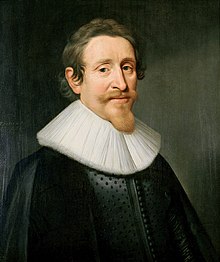Hugo Grotius
| Hugo Grotius | |
|---|---|

Hugo Grotius – Portrait by Michiel Jansz. van Mierevelt, 1631
|
|
| Born | 10 April 1583 Delft, Holland, Dutch Republic |
| Died | 28 August 1645 (aged 62) , Swedish Pomerania |
| Alma mater | Leiden University |
| Era | Renaissance |
| Region | Western philosophy |
| School | Natural law |
|
Main interests
|
Philosophy of war, International law, Political philosophy |
|
Notable ideas
|
Early theorist of natural rights, sought to ground just war principles in natural law |
|
Influences
|
|
|
Influenced
|
|
Hugo Grotius (/ˈɡroʊʃiəs/; 10 April 1583 – 28 August 1645), also known as Huig de Groot (Dutch: [ˈɦœyɣ də ɣroːt]) or Hugo de Groot (Dutch: [ˈɦyɣoː də ɣroːt]), was a Dutch jurist. Along with the earlier works of Francisco de Vitoria and Alberico Gentili, Grotius laid the foundations for international law, based on natural law. A teenage intellectual prodigy, he was imprisoned for his involvement in the intra-Calvinist disputes of the Dutch Republic, but escaped hidden in a chest of books. He wrote most of his major works in exile in France.
It is thought that Hugo Grotius was not the first to formulate the international society doctrine, but he was one of the first to define expressly the idea of one society of states, governed not by force or warfare but by actual laws and mutual agreement to enforce those laws. As Hedley Bull declared in 1990: "The idea of international society which Grotius propounded was given concrete expression in the Peace of Westphalia, and Grotius may be considered the intellectual father of this first general peace settlement of modern times."
Additionally, his contributions to Arminian theology provided the seeds for later Arminian-based movements, such as Methodism and Pentecostalism and he is acknowledged as a significant figure in the Arminianism-Calvinism debate. Because of his theological underpinning of free trade, he is also considered an "economic theologist".
...
Wikipedia
